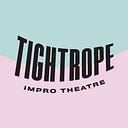Why I Needed Improv to Help With My Public Speaking Skills
By Afrothiti Yannitsos
As an extrovert, and somebody that really enjoys public speaking, I thought that there was no need for me to enroll in a public speaking course. I mean, I never get nervous, I gain my energy from others, and it’s something that I really like to do! Let’s just say that after I took this course, I realized that I had so much more to learn. Here are some of the takeaways that have helped shape me into becoming a better public speaker:
Takeaway One: Slow Down
I was expecting this piece of feedback as I am naturally a very excited speaker — but I couldn’t actually find a sustainable way to think about how to solve the issue, until my instructor Dan Dumsha pointed out to me exactly what was happening. We did an exercise that involved myself talking about a subject for 1 minute, that I had prepared the week before. I thought to myself “ I am going to try to be aware of my speed” and speak slowly. What Dan noticed was that I was trying to speak faster than my brain could catch on, resulting in me putting in quite a few filler words like “uhm” and “so”. When I did it again, I slowed down, and noticed a huge difference in the synchrony of my thoughts and words.
Takeaway Two: Use Silence to Your Advantage
Once I started to slow down, I realized that my biggest internal issue was being uncomfortable with silence. I have always been the person to carry the conversation in the car on road trips, in order to avoid any awkward or uncomfortable silences. I learned through this course that silence is actually the most powerful tool you can use when public speaking. It allows the audience to slow down with you, and it brings more meaning and connection to each sentence you are saying. I still have to practice being comfortable with silence, but being more aware of it has helped me catch it, and lean into it!
Takeaway Three: Pivot
No matter what you prepare to say in front of a crowd — you need to respond to the reaction you are getting from the audience. This helps you build a better connection with the people you are talking to. In other words, you have to be a master of reading the room, especially when you are on stage (or zoom). We did an exercise which involved my classmates reacting to my story with different emotions. Whenever I saw those emotions, I had to alter the way I was telling my story. It was a very interesting way to understand that the way you tell your story to an audience is much more important than the actual content at points. I often bring an element of comedy to everything I say — which works in some areas but not all. I got the feedback that I needed to change my tone when talking about more serious subjects. The funny this is — I thought I was being serious by reverting to my auto-pilot tone, which ended being more comedic than I realized.
All in all, this course helped me realize that having an expert listen to the way I was talking was truly the only way I could understand the subtle things I needed to change. I now have these points written down in front of my mirror — so I can reference them every time I have to speak on zoom.
If you are interested in taking this course, check out https://tightropetheatre.com/ and sign up today!
